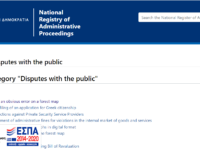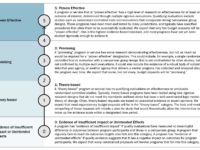Marea Digital allows citizens to report local problems to the government, as well as local initiatives that are working for the communities’ well-being. Contrary to similar kind of initiatives, it’s innovative because it uses tech to allow the citizens to aggregate data about their communities’ problems, but also includes an offline strategy for the local government to design solutions with the citizens to solve the problems reported, fostering dialogue and collaboration to solve…
Innovation Tag: Public Policy
Case Study
Trusted Official Statistics for Good Governance and Evidence Based Decision Making in Vanuatu

The Parliament of Vanuatu has struggled to fulfil its legislative, budget, oversight, and representation functions due to limited capacity to utilise trusted statistics. The Vanuatu Bureau of Statistics addressed this capacity gap through targeted training with Members of Parliament (MPs) and parliamentary civil servants to improve policy making. This is the first focused effort in Vanuatu to introduce data for sustainable development monitoring to MPs with the aim of enhancing good governance.
The Fourth Industrial Revolution brings many opportunities, but also new challenges for public administration. The online training for the Fourth Industrial Revolution: New Technologies, teaches public servants and private sector employees the basics of AI, Blockchain, Virtual Reality, IoT, 3D printing, Robots, Drones and the Digital Economy. Through quizzes, games and many illustrative examples, participants can immerse themselves into the modern world of emerging technologies, which is crucial…
Digitization of administrative procedures of the public administration drastically and positively impacts the operation of registry offices, the centers of public services, and the overall interaction of citizens and businesses with their government. However, developing a National Registry of Administrative Procedures is a huge challenge for all governments that want to systematize and simplify their processes. The Greek Registry of Administrative Procedures and Services, also known as MITOS…
The innovation consisted in implementing a policy delivery methodology (Deliverology(R)) in 14 public primary healthcare establishments of Cusco’s Northern health network. The aim was to transform the service culture and improve prenatal, postpartum, family planning, and pediatric care indicators in only 5 months, benefiting 22,900 low-income patients.
The UK government launched a new “youth hub” offer of employment services to young people affected by the disruption of the covid-19 pandemic. Through four days of workshops with key stakeholders, which included engaging young people, Impetus ran a theory of change process to enable one of the flagship hubs to co-design their new service to best serve young people. This is the first time that Impetus has applied its theory of change tools, and its impact focus to a government policy…
Governments must judge hundreds of new programmatic budget proposals each fiscal year with little objective information about whether they will achieve the results claimed. Evidence of program effectiveness is a critical data point that is used when making budget and policy decisions, as programs with greater evidentiary support are generally more likely to deliver a high return on investment of public funds. The The Policy Lab at Brown University leveraged existing public clearinghouses of peer…
The UK Government Policy Profession has piloted a new model called Shared Policy Capability Project to support department leaders and policy makers undertake a facilitated self-assessment of their policy environment and identify opportunities for improvement. Through this the government aims to build capability at a department level and enable policymakers to take an active role in improving the environment in which they make policy.
Case Study
School-Effect Indicator: An analysis of schools, using artificial intelligence, according to the…

The São Paulo State Court of Auditors built a new analysis methodology, the School-Effect Indicator (IEE), which includes factors such as the socioeconomic status of students in the evaluation of school effectiveness. Through Artificial Intelligence (AI), it is calculated how much the school has contributed to the competence of its students, highlighting the principle of equity, recognizing the needs of each school group and working to reduce the impact of differences.
The Buenos Aires City Government launched Climate Action, an open data platform that brings together energy efficiency, sustainability and waste management policies to combat climate change in the city. The platform is based on transparency, co-creation, collaboration, citizen participation, accountability and innovation. BA Climate Action was co-created with civil society organizations, environmental experts and citizens.







